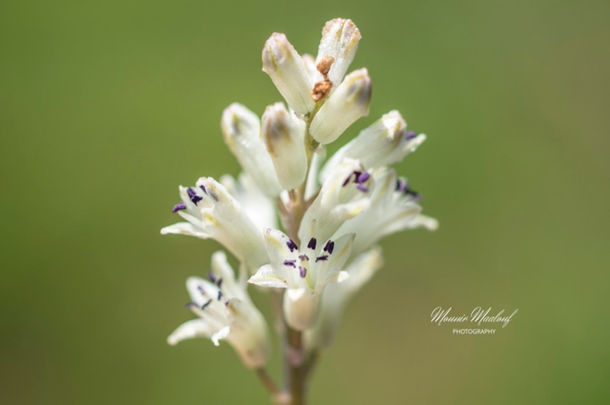Family |
Asparagaceae
Bellevalia flexuosa
Boiss.
Bellevalia flexuosa Boiss.
(Nouvelle Flore du Liban et de la Syrie, vol. 1, Pl. LXXVIII nº 8; 1966)
Life-form & habit: Bulbous perennial with 3–7 (rarely up to 10) linear-lanceolate, prostrate, somewhat undulate leaves, usually longer than the flowering stems.
Stems: 1–4, 8–25 cm tall.
Inflorescence & flowers: Cylindrical, lax raceme with 12–50 flowers (typically 15–20), generally equalling the stem in length. Bracts small but visible. Pedicels usually shorter than the flowers, often spreading-erect at anthesis.
Perianth: Turbinate, 6–10 mm long, white or sometimes pale blue with green veins, soon becoming livid. Free segments ovate, twice shorter than the tube, with yellow or green nerves. Anthers lilac or purple.
Fruit: Capsule 8–10 mm long.
Phenology: Flowers from May to June.
Habitat & elevation: Uncultivated places, occasionally waterlogged in spring, not restricted to high elevations.
Lebanese distribution: Ct. Saïda, Saïda–Joun road, Beirut, Tripoli, Khaldé; Mi. Baabda, Qrayé, Bchéla, Chahtoul, Douma, Beskinta; Mm. ‘Aïn Zehalta, Sofar, Mdeireje, Dahr-el-Baidar, Ehmej, Laqlouq, Maasser Cedar forest, Afqa, Khan Sannine, Sannine, Hadchit, Cedars, Jourd Hadeth, Ehden, ‘Aïn Souccar near Sir, Faraya; Ve. Mreijatte; Met. Zahlé; Herm. Kfar Zeit.
Syrian distribution: Ct. Hamidiyé; A.L. Jabal Qalamoun; Dam. Road to Quneitra, Mezzé; Sud. Khisfine, Hammé.
Native range: Lebanon-Syria, Palestine, Saudi Arabia, Sinai. Mentioned also from Kuwait but needs confirmation. (KEW, GBIF)



